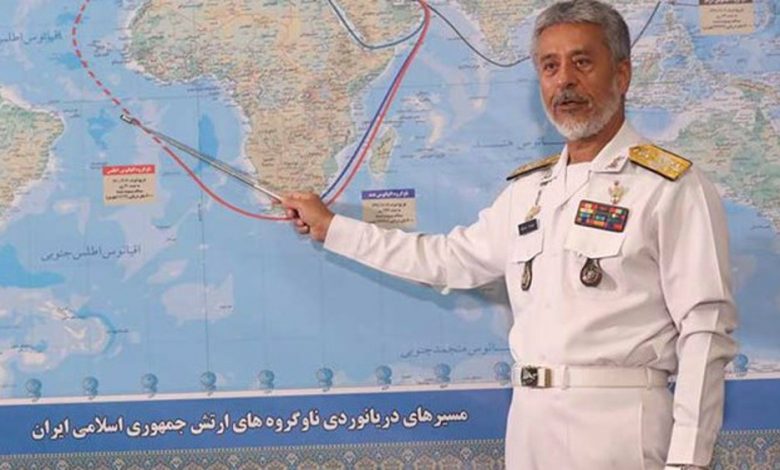US cannot take direct action under intl. law against Iranian ships in Atlantic, says Foreign Policy
The United States cannot take direct action under international law against two Iranian ships on a voyage toward the North Atlantic Ocean even if the vessels are violating US sanctions, according to a Foreign Policy article.

Late last month, Politico reported that the US national security community had been monitoring for the previous two weeks two Iranian vessels whose ultimate destination might be Venezuela.
Citing three people familiar with the situation, the American news website said the vessels, including the Makran port ship and the domestically-built Sahand destroyer, have been heading south along the east coast of Africa.
In response, Iranian Foreign Ministry spokesman Saeed Khatibzadeh said Iran has always been present in international waters and is entitled to such rights under international law.
“No country can violate this right,” Khatibzadeh told reporters on May 31, while warning the US against any miscalculation and saying, “Those who are sitting inside glass houses should be careful.”
Politico later cited unnamed American officials who claimed that the ships are believed to be carrying arms intended for transfer to Caracas.
In an article published on Thursday, Foreign Policy argued that any US action against the vessels would be unlawful and undermine sovereign immunity as a core tenet of the international order.
“The costs of direct action would be severe, exposing the United States to charges of hypocrisy toward the rules-based order and potentially opening US naval vessels to similar treatment by adversaries,” the American news publication said, arguing that the United States should “employ diplomacy rather than force” and encourage states along the route to deny the Iranian vessels port access if requested.
It added that in times of peace, sovereign immunity is a practically all-powerful ward against a foreign state’s jurisdiction, with exceptions only in extreme circumstances involving failed states, fake warships, or weapons of mass destruction. “This case, however, is textbook.”
On Thursday, a top Iranian commander confirmed that the two ships have entered the Atlantic Ocean, reiterating that Iran is entitled under international law to have a naval presence in international waters.
Deputy Chief of Army for Coordination Rear Admiral Habibollah Sayyari said the ships have managed to reach the Atlantic Ocean without calling at other countries’ ports, marking the first time the Iranian navy has gotten this far into the Atlantic.
The Iranian ships’ journey across the Atlantic has been described as a “significant step” for Iran’s navy, showing the Islamic Republic’s naval capabilities and the Iranian Navy’s increasing access to the Western Hemisphere.
Sayyari explained that the vessels departed from the Iranian port city of Bandar Abbas in the Persian Gulf on May 10 and has so far sailed some 6,000 nautical miles, about 12,000 kilometers, going around the Cape of Good Hope during their thirty days of traveling in high seas.
While Tehran has not commented on the ships’ destination nor their cargo, it has pointed out that there is no ban on Iran’s sale of weapons to other countries under UN Security Council Resolution 2231.
“America has long tried to get the resolution violated [by others], but to no avail,” Ali Rabiei, the Iranian administration’s spokesman, said at a weekly press conference on Tuesday, making a reference to Washington’s failed attempts last year to keep a 13-year-old arms embargo on Iran, which finally expired on October 18.
Asked about the arms embargo, US State Department spokesman Ned Price confirmed that it expired in October, saying, however, that “it is in many ways a shame that an important tool was no longer available.”
Nevertheless, Price told reporters on Thursday that the United States is prepared to “leverage our applicable authorities, including sanctions, against any actor that enables Iran’s ongoing provision of weapons” to what he called violent partners and proxies.
“We will continue to apply pressure on Iran if it attempts to transfer any weapons to violent partners and proxies,” he reiterated.
While underlining the necessity of freedom of navigation and admitted that the US is unaware of the destination and cargo of the Iranian ships, the American spokesman went on to warn Tehran against “the transfer of weapons or other illicit materials”, claiming Washington can try to “eliminate such activity.”
Foreign Policy further pointed to the UN Convention’s Article 5, which reads: “Warships on the high seas have complete immunity from the jurisdiction of any State other than the flag State,” arguing that even in the territorial sea, sovereign immunity remains a powerful protection and that warships enjoy the right of innocent passage in foreign territorial seas.
“As long as the warship is engaged in innocent passage, not threatening the coastal state, the coastal state can, at most, order the warship to leave the territorial sea,” it said. “Interdiction or arrest are out of the question unless the warship threatens the coastal state, at which point self-defense would be permitted.”
The article maintained that nothing changes even if US officials ascertain the vessels are carrying conventional arms that violate US sanctions on Caracas, and so long as the Iranian warships do not threaten use of force, sovereign immunity protects them wherever they are.
The Foreign Policy article also noted that even if an attempted enforcement action by the US succeeds both operationally and legally, the US could put US naval vessels around the world at jeopardy.







